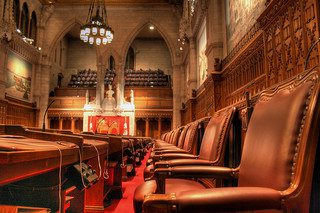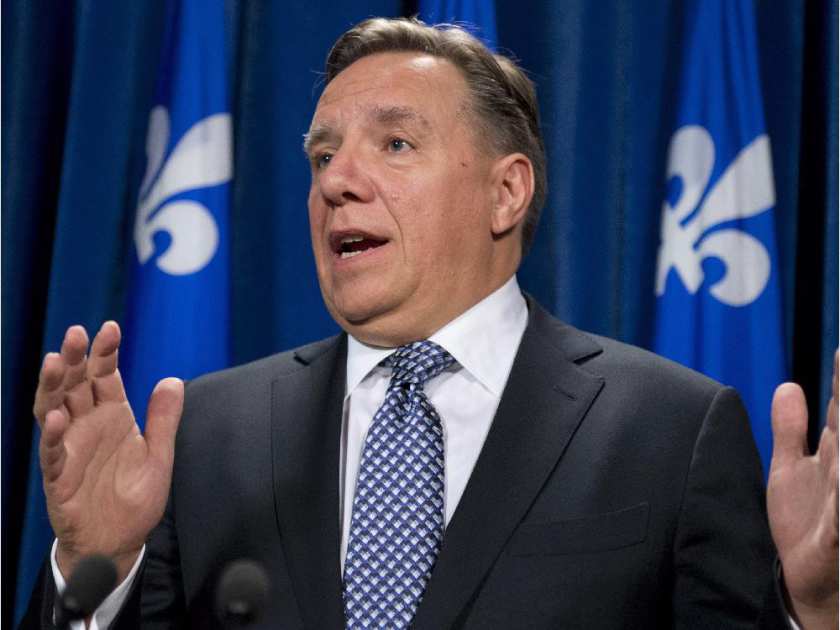As the back-and-forth over the budget implementation bill raged between the Senate and House of Commons last week, tempers flared over slights both real and imagined, but through it all, something unexpected happened that may have made Leader of the Government in the Senate err, "government representative" Peter Harder's position untenable going forward.
Backing up to last Wednesday, the House of Commons sent their message saying that they disagreed with the Senate's proposed amendment to delete the escalator clause on the excise tax on beer and wine (the reasons for which ranging from a dislike of new taxes period, to the principle by which an automatic escalator means that the government didn't have to come back to Parliament every year to increase taxes which amounted to a breach of the principle of no taxation without representation). There were two problems with it, however. The first was the boilerplate language in the rejection, insisting that it infringed upon the rights and privileges of the House something that the Senate was already terse about after Prime Minister Justin Trudeau's statements in the days leading up to the vote that the Senate didn't have a right to amend money bills (when clearly they do under the constitution they simply can't initiate them). The other problem was that rejection of the Senate's proposed amendments were not spoken to by the Minister of Finance, nor debated in any way they were part of an omnibus motion that the Government House Leader, Bardish Chagger, moved as part of a housekeeping motion to ensure that the Commons rose for the summer that night.
The off-hand dismissal of the Senate's amendments was considered by many senators to be a slap in the face, and is part of that ham-fisted style of legislative management that Chagger has come to exemplify. And when the message was received by the Senate, Harder moved that they deal with the motion immediately something that he got pushback on because the normal course of the Senate is that things are dealt with the following day unless they get consent to do so. A vote was called with a one-hour bell, with the intention that if Harder got the go-ahead to deal with it right away, he would move a motion that the Senate not insist on its amendments, passing the budget bill so that it could go for royal assent (and MPs could go home for the summer without worrying about it).
During that hour, as senators filtered into the Chamber, there was a sour mood in the air at the manner in which the Commons responded to the Senate, and Senate Liberal leader Joseph Day began circulating a proposed amendment to Harder's motion, that he planned to move if the vote went ahead. Harder saw that he had a problem because he didn't want to deal with Day's amendment. Harder ended up voting against his own motion, along with all of the independent senators, and which pushed off debate on the Commons' rejection of the Senate amendments until the following day, buying Harder more time.
The various Senate groups began working on their own motion which would affirm the Senate's ability to amend any bill it likes given its constitutional powers to do so, and all groups were in on the discussion. The plan was for this to be an amendment to Harder's motion to let the budget pass the next day, but over the course of the discussions into the next morning, Harder had gotten wind of the plan and proposed a new motion that would add the new language that while the Senate was not going insist on their amendments, they would remind the Commons that the Senate has the right to amend bills. That the Leader of the Government would send this message to his own government was unprecedented, and is hugely problematic. (This motion passed, with the Conservatives dissenting as well they should as the Official Opposition).
This puts Harder into a particular bind. If he had been thinking things through properly, he should have allowed the other groups to put forward their amendment that he could have either voted against or abstained from voting owing to his responsibility to the government, let the amendment to his motion be added, and then vote for the amended motion in the end thereby giving himself some distance and political cover. But by trying to play the hero and insisting that this message to the Commons be part of his own motion, Harder created a particular break in his role as the Government Leader, as his thumbing his nose at the very government he represents is a very provocative action. It also exposes the government.
The situation that Harder has created for himself is quite possibly untenable going forward, and makes things awkward for the government in the House of Commons. Which party there gets to raise this as an issue? The Conservative Senators were the ones trying to move amendments, and the NDP doesn't believe in the Senate period, and because Chagger's ham-fisted motion being voted in unanimously by all of the other parties, everyone wears the initial provocation.
If anything, this is one more mark in the column of how poor of an idea it was the whole time to have Harder acting as a supposed "independent" representing the government in the Senate (which is an oxymoron to be certain), rather than his being an actual cabinet minister like the Leader of the Government is supposed to be. This faux independence, combined with Harder's lack of experience with the rules of the Chamber, helped to create this mess. That this was almost certainly part of his quest to be seen as the leader of the "independent" Senate writ large, flexing his muscles in protecting its rights and privileges against the government, makes him unable to actually represent the government in a serious capacity going forward. More than that, it shows that Trudeau's attempted reform of the Chamber continues to have some fundamental flaws in its execution.








